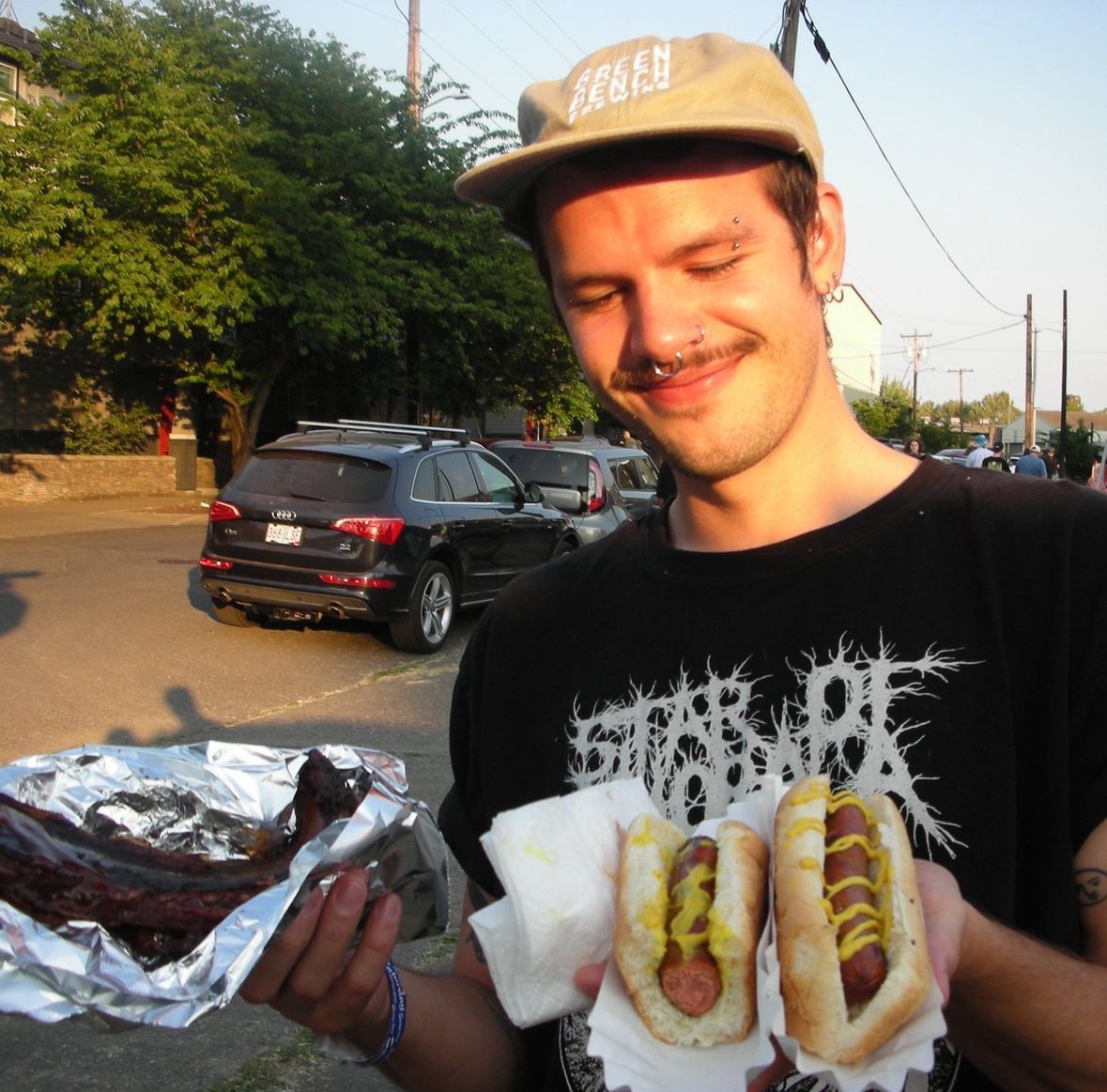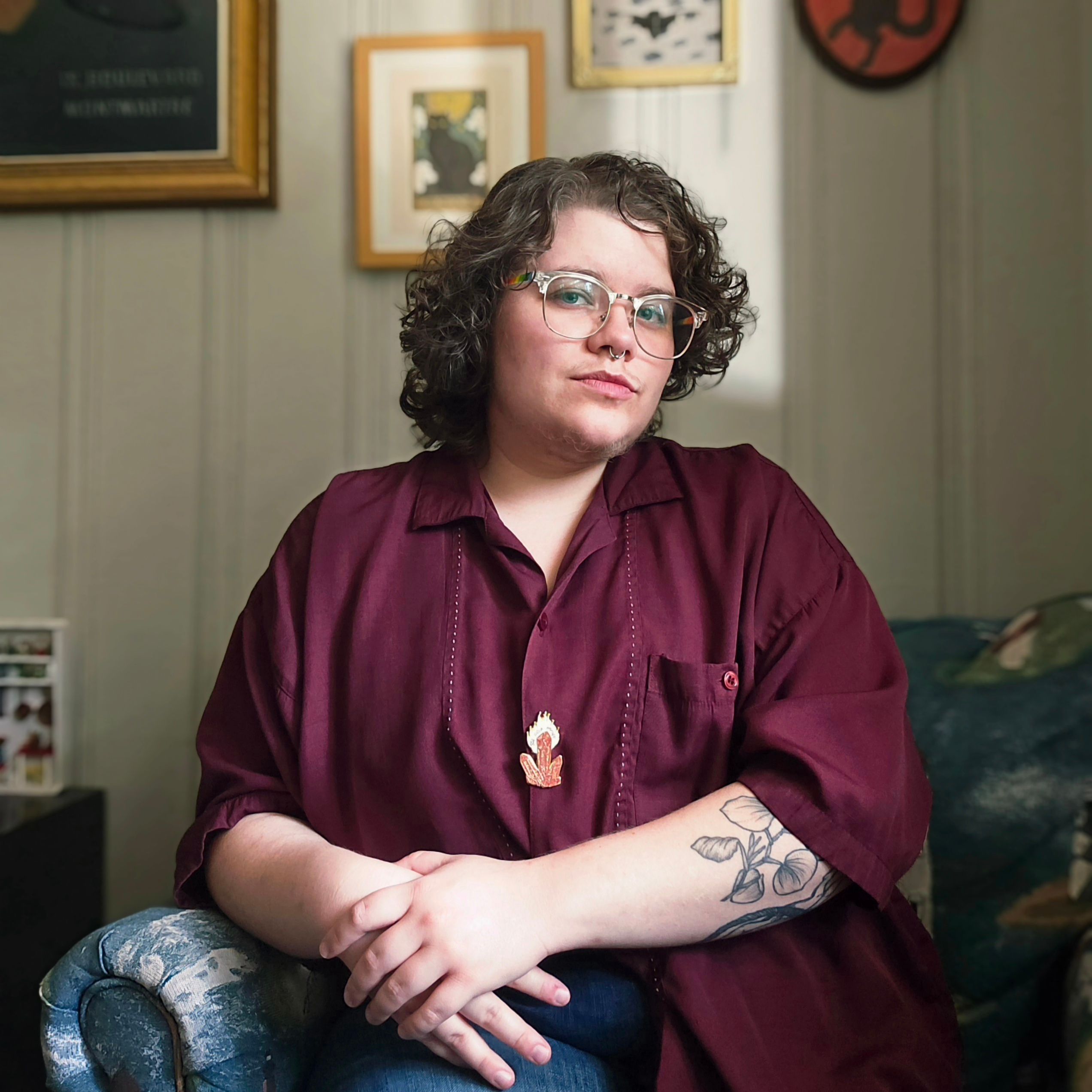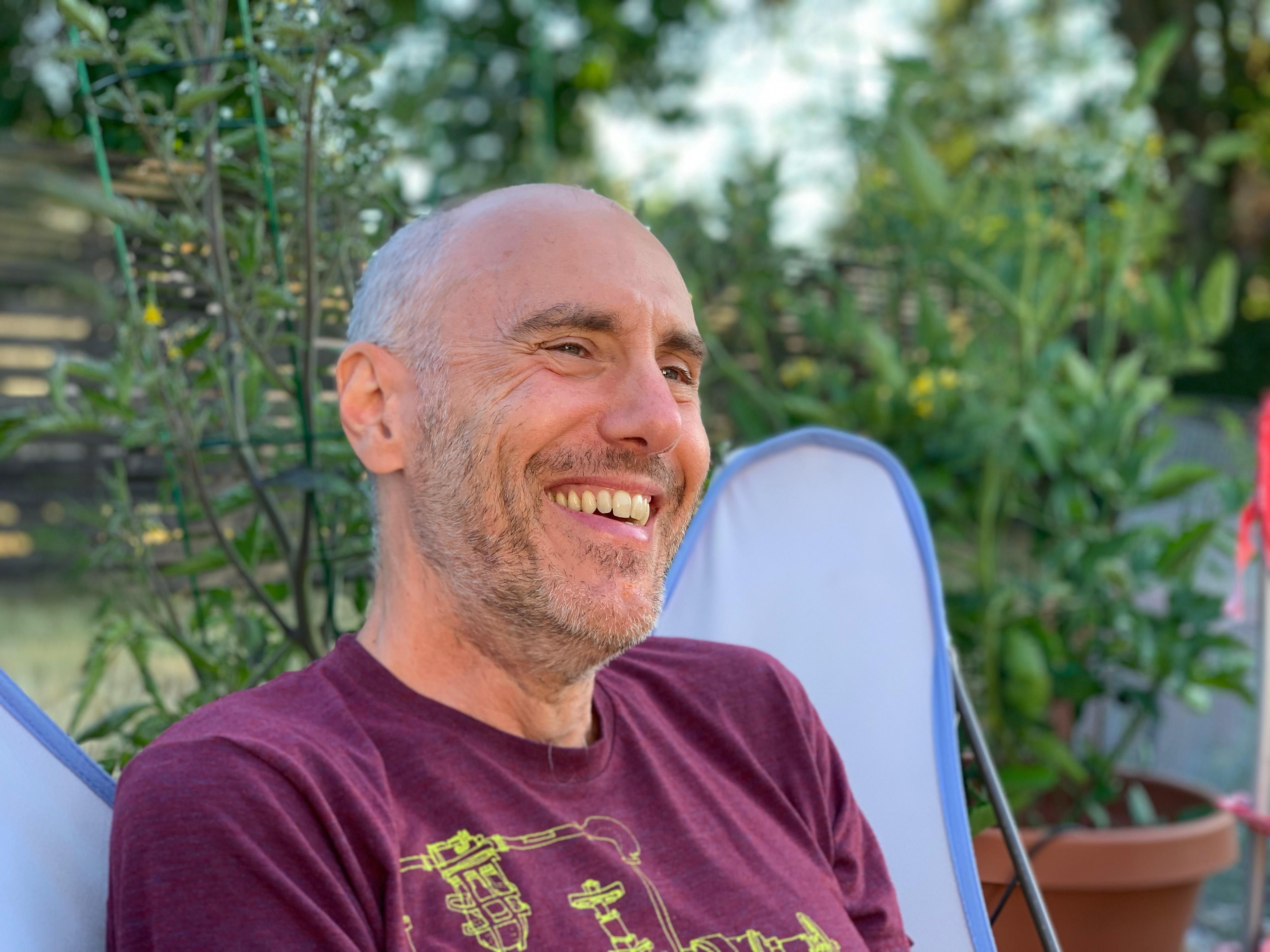Brooke Champagne is an award-winning essayist and assistant professor in the MFA program at the University of Alabama. Her debut essay collection, Nola Face: A Latina’s Life in the Big Easy is available now from The University of Georgia Press.
The dedication page in Nola Face, like a miniature of the book itself, already hints at what the reader is to expect. There’s a quote from Lorca, in the original Spanish; a quote from Bob Dylan about the city of New Orleans, where Brooke grew up; and finally, but most importantly, a quote from a man called Turd who read Brooke her tarot cards, which goes like this: “You will never write a book.” At the end of the journey, Nola Face left me with a sense of rebellious humor and pride. A pulsing strength. It also left me with questions about identity and cultural heritage. Brooke’s answers brought me back into that same feeling, shone a light on her writing process and gave me even more to think about, which is precisely what a good writer does. Below is an edited version of our conversation.
Retracing and Writing Identity: A Conversation with Brooke Champagne
Retracing and Writing Identity: A Conversation with Brooke Champagne

Eleonora Natilii: You've blended Spanish with English in some of these essays, which made me wonder about your audience. Do you consider other Latinx readers as your primary audience, or, conversely, feel the need to convey your Ecuadorian background without worrying that something may be lost to some readers? In other words, whom do you feel yourself in conversation with? Could the answer also be, simply, yourself?
Brooke Champagne: Most essays are to some degree a conversation with oneself. Whatever the subject—personal, cultural, political, some combo (as I think most of my essays are)—the major work of it for the essayist is figuring out what one thinks, and why, and what that figuring-out process means for both writer and reader. As an essayist, I hope to take readers on that reflective journey of my mind by summoning my memoirist side, providing interesting scenes to look at along the way.
In terms of integrating the Spanish, no, I don’t worry about readers getting lost. I take care to provide context clues about what those Spanish words mean, and the project of Nola Face is certainly aimed beyond the limited audience who shares my ethnic background (or my gender, or sexuality, or class, or political beliefs, or any possible marker of intersectionality). My intention is for anyone who likes a good story to be ready for my hopefully-fun-and-sometimes-scary essay ride.
EN: On page twelve you write: “Walking through my city way past bedtime, past a girl who shaved her head and fought and became a statue, I imagine I, too, could someday control my own destiny. I won’t have to choose between Spanish and English, Lala or America, God or godlessness. I can be one with the streets of Orleans once rescued by a girl.” Has this wish been granted, once and for all, or is it an ongoing quest?
BC: I love that you’ve highlighted this excerpt from my essay “Cielito Lindo,” which centers around one time (though there were many such instances) when my grandmother Lala plucked me from bed and drove us to the French Quarter in the middle of the night for beignets at Café du Monde. It’s a funny moment for me because it captures a childish innocence and ignorance about what I was actually experiencing. Obviously, Joan of Arc (whose statue resides in the Quarter) did not rescue New Orleans, because the city did not yet exist during her lifetime, but Lala “read” the statue literally, thus so did I.
As to your question, do I control my own destiny... I mean, yes? I’d like to think so. Yet it’s also true that some of the binaries Lala set up for me so early on in life did require that I make distinct choices she didn’t agree with. I went to college and graduate school literally to study English as a language and means of communication; I did not study Spanish. (Okay, I did study Spanish, as I was required to take two years of foreign language, and was met with contempt from both prof and peers for being an advanced speaker.). It feels like the implicit question undergirding yours is, “Brooke, can you have it all?” And my answer is, “No, Eleonora, I cannot.” And further, I am fine with that, because I’m growing old and tired and how would I live with it all, anyway.
EN: Like your Abuela, my mother also has a habit of telling different and fictionalized versions of past events. Have you found a way to make peace with the impossibility of telling fiction and truth apart? How did you manage to befriend these maybe-lies that have become important parts of your identity?
BC: Maybe because I come from a liar who was often unaware of her lies and was an ultra-performative personality, it has given me a congenital bullshit-detector when it comes to telling truth versus fiction. Have you ever met someone who had the tendency to say something along the lines of, “I’m the kind of person who [fill in the blank with their most desirable adjective/quality]”? When I hear this, I reflexively think, “Nope, that’s not who you are, that’s the *performance* you. That’s only how you want to be viewed by others.” And hey, no judgment. I’m not even saying I’m above being full of shit or performative myself—I am Lala’s granddaughter, after all. But in an essay, that’s where I get to take the time to assess what is actual, meaningful, and real. On the page I can calibrate who I want or purport to be versus who I’ve been and who I am. All of this to say, I try my hardest to be honest with readers about what’s truth versus fiction, and that means admitting when I’m not sure what the truth is (which happens often). In fact, in many cases that’s when I know an essay is finished: when it feels like none of it feels false anymore. It can take a very long time for me to get there, perhaps because I’ve been grudgingly trained by the best-of-the-best liars.
EN: "It requires the devotion of a child to continuously ask for more when resolution is out of reach.” This sentence opened something and filled me with the sense of being in the presence of truth. Could you elaborate on it a bit more?
BC: This quote comes from the end of my essay “Lying in Translation,” which may offer the fullest introduction to the complexities of my relationship with Lala and the vagaries of our languages. The context of that quote is that Lala would play this game with me, which is really a story, but also not a story, called “El Cuento del Gallo Pelón” (Translation: The Bald Rooster Story). One without a beginning, middle, end, or even meaning, though readers will have to read the essay to fully understand what I’m talking about here. One of the things “Lying in Translation” doesn’t state explicitly is the act of playing this storytelling game with Lala was a formative one. I’ve been asked before if there was an “aha” moment in my discovery of myself a writer. I realized I’ve had many. This essay names one of them, when Lala called me a writer in Spanish (una escritora) for the first time. But an earlier, recurring inspiration was playing “El Cuento del Gallo Pelón” with Lala. She showed me by telling me this non-story that stories required an audience, a willingness to be curious and frustrated, and that maybe stories won’t always begin or proceed or end the way you want them to. But if you make them interesting enough, they’re still worth listening to, and telling aloud, and writing down.
EN: My mother likes to remember how the Italian immigrants she met while living in Switzerland seemed more Italian than the Italians back home. As if one could overdo identity in fear of losing it. What do you think of this, having grown up among Ecuadorian immigrants?
BC: This question may be above my psychological paygrade, and I don’t know if my background can even help me answer it, but I’ll say this: performance of culture and ethnicity is unique to every person and influenced by a million factors of daily life. It’s impossible to quantify. I could totally imagine how an immigrant fearful of losing their homeland and its practices would lean into those practices in ways that might induce observers to respond with some version of Big Eyeball Emoji. Yes, my grandparents were Ecuadorian immigrants who had many Ecuadorian and Hispanic friends, but I never observed them performing culture. They were being themselves, speaking their languages, just… living. Unfortunately, I have no basis for comparing how they’d be back in Ecuador, as I never saw them in that environment. I’ve never even visited Ecuador. At least, not yet.
EN: In some of your essays, you mention the fact that Spanish has been slowly drifting a bit further from you since you only spoke it with your Abuela. Towards the end of the book, you reveal that your mother and you never spoke Spanish, and this, in turn, led me to safely assume that you don’t speak Spanish with your children. I'd like to ask you how the loss of your other language affects and interacts with your sense of identity.
BC: Your assumption is safe with me! You’re right, my kids and I don’t speak Spanish together. Generally, that causes me some anxiety, but then again, what doesn’t? That said, my sense of identity or any kind of loss of it is not something I’m actively aware of or concerned with day-to-day. Some folks don’t understand how my mother and I could’ve never spoken Spanish with each other, but the context in which she came to this country matters. She spoke no English when she came to the United States as a child in the 60s, and the nuns who led her Catholic school held rulers ready to snap if she spoke Spanish. I cannot imagine the trauma of a child facing this, but my mom just shrugs her shoulders and is like, “yeah, well, that made me learn English fast.” The message to her was clear: Americanize immediately. So she did. She never spoke Spanish after that unless she needed to, with her parents, and (forgive me now for speaking for my mother) I think that linguistic shift gave her what she needed, which was to feel like an American. Which all these decades later, clearly, she fully is.
As for me, I don’t feel less ethnically Ecuadorian or anything because my Spanish isn’t as great as it could be or once was. I just feel stupid. And pissed. I mean, the language is fully there inside of me, but because it rarely gets a chance for release, that can be frustrating. What’s funny is whenever I begin a conversation with a native Spanish speaker, they get super excited hearing my accent. It’s a pretty good one since I grew up speaking the language, so they start talking un poco rapido (aka fast). Most of which I can understand, but I can’t respond as fluently or ardently as I’d like. And I hate that because I come across in Spanish as more timid, more careful (two adjectives that do not align with my linguistic patterns in English). Probably my most spoken words in Spanish as an adult have been, Por favor, mas despacio. (Do I need to translate those lines? I mean, if Justin Bieber can sing “Despacito,” I hope readers get it.)
EN: I'd also like to know whether letting go of Spanish implies a certain letting go of your background, the same as you explicitly say about your Nola slang and New Orleans-working-class way of speaking. In the end, what are the things you feel you'll never let go of? Is there anything from your Ecuadorian heritage that you try to pass on to your children?
BC: It’s probably true that the things that annoy me most about myself are the ones I’ll never be able to let go of, and the good and holy things I’ve inherited, culturally or personality-wise, will fade like a nice summer tan in late fall. Historical resentments I’ll smile through, even joke about years and decades later, but I never really let anything go (remember this, people who have hurt me). This holding on to dumb old shit is one of the many things I hope not to pass onto my children!
What do I try to pass on? I don’t know if it’s anything particularly Ecuadorian, but I hope I’m passing on Lala’s enormous capacity for love. I grew up hearing Lala bestow on me daily superlatives, so that doughy emotional part of me is something I’d like to pass on, along with the toughness acquired from… well, the experiences throughout the rest of my childhood. Like any family, mine has our little love language and phrases, and I have no qualms telling you both my kids believe I’m “the best mom in the whole entire world.” They’re very trustworthy individuals at ages eight and four, so I take them at their word.
As you mentioned, my kids aren’t bilingual, but there are so many Spanish phrases we speak together that I hope will always be nostalgic parts of young lives. Their nightly lullabies are in Spanish. They still believe the word for “pajamas” is “pijamas.” My daughter came home from school a couple of years ago so annoyed that other kids were mispronouncing sleepwear. Her words: “for some reason these kids are sticking a ‘jam’ in the middle of the word when it’s supposed to be a ‘yom.’” When my son won’t stop asking the same question over and over again, my daughter will scold him: “ese disco se rallo.” Meaning: that record is scratched. They can even roll their r’s! Sort of. Look, it’s an enunciative work in progress. (You see, I can’t even lie when given a perfectly easy opportunity to do so.)
Eleonora Natilii
author
Eleonora Natilii is an Italian writer and translator. Her own work has yet to appear in English, so don’t hang up.








